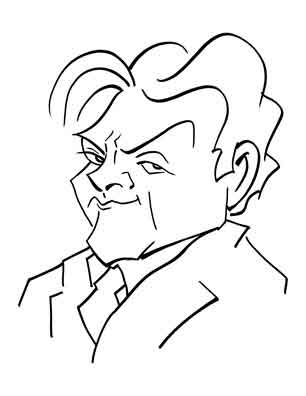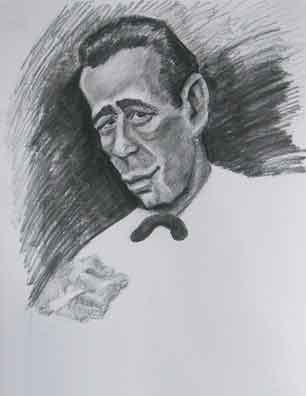James Cagney - Toe Tapping Tough Guy

James Cagney
He never said it.
We all know that James "Jimmy" Cagney's most famous line from his sixty-eight motion pictures was "You dirty rat! You're the guy that killed my brother!" Alas, like so many other - quote - "famous lines" - unquote - this most famous of famous lines was never delivered. But in one film Jimmy did sneer, point his finger at some fink, and spit out, "Man is but an ass if he go about to expound this dream."
I forget just who wrote that movie. Some guy named Will.
It's hard to believe, knowing how iconic Jimmy is today, but it wasn't until he reached the grand old age of 31 that he was cast in his first movie - and not in a bit part either. But like most actors of his era James Francis Cagney had started his career on stage. By 1930, he was held in high enough regard that he was cast as the bad guy - officially a secondary role but really the main part - in the original Broadway run of Penny Arcade along with a pre-Gold Diggers Joan Blondell. The play opened on March 10, 1930 at the Fulton Theater and ran for a whopping 24 - count 'em - 24 performances. With matinees and all, it didn't even finish out the month. But for some reason Hollywood decided to make the play into a movie, retitle it as Sinner's Holiday, and to give Jimmy and Joan the same parts. Like some other films based on unsuccessful plays - Casablanca, The Lion in Winter - Sinner's Holiday was a success although it was only about an hour long.
Sinner's Holiday catapulted Jimmy into the then popular "gangster" films - as much a staple for the 1920's and 30's then as westerns were up past the mid-twentieth century and horror, sci-fi, zombie, and (yawn) action movies are today. But it was really the film The Public Enemy - which also featuring Joan - that solidified Jimmy as the tough talking hoodlum, particularly after the scene where he smashes a grapefruit into Mae Clarke's face.
Jimmy's distinct delivery - in its own way as unique as that of fellow gangster star Edgar G. Robinson - today can come off as nothing more than stereotypical film mobese. But really it was Jimmy's lingo that created the stereotype of gangster film talk. But yes, sometimes - as Yogi Berra might have put it - Jimmy didn't really say all the things he said. It's the same with lots of films and books. After all everyone knows Humphrey Bogart never said, "Play it again, Sam", none of the Tarzan actors ever said "Me Tarzan, you Jane", and in none of the fifty-six original short stories and four novels, did Sherlock Holmes ever say "Elementary, my dear Watson".
Instead in Casablanca, Humphrey said, "You played it for her. You can play it for me. If she can stand it, I can. Play it!" In Tarzan the Ape Man, Johnny Weissmuller said "Jane! Tarzan! Jane! Tarzan!" And in the opening chapter of the Hound of the Baskervilles, Sherlock Holmes commented to Dr. Watson that the problem of Dr. Mortimer's walking stick was "Interesting, though elementary".

Joan Blondell
Starring with Jimmy
And just what did Jimmy Cagney say that gave us the legend of his "dirty rat" quote. Well, his actual words in Taxi! as he cornered a rival in a closet were "Come out and take it, you dirty yellow bellied rat, or I'll give it to you through the door!" But he's foiled as some cops show up.
But who knows? Maybe there is some truth to the legend. There is another scene, though, where he gets out of his taxi and goes to another driver. As he walks toward the cab, you can hear him say "You dirty [unintelligible]." Some think he is actually saying "Your dirty rat!". But he never mentions his brother.

Humphre Bogart
Neither did he.
Still for many modern movie aficionados, the acting style of Jimmy and his fellow thespians in his early movies comes off a bit heavy and overdone. That, though, is the problem of evolving artistic styles coupled with limitations of technology. But Jimmy continued playing roles well after camera and sound equipment permitted actors to speak in more normal naturalistic tones, although even today lines in television and movies are not really delivered as people speak (if you've ever watched an actual making of a film, the difference is evident when the action stops).
Not surprisingly, Jimmy's best roles were those where he could step out of his gangster persona. No, we're not talking about him playing George M. Cohan in Yankee Doodle Dandy, Captain Morton in Mister Roberts (although it is a good movie), Rhinelander Waldo in Ragtime, or even Bottom in Shakespeare's A Midsummer's Night Dream. Instead, the official CooperToons opinion is it is the 1961 comedy One, Two, Three where Jimmy played a Coca-Cola executive living in West Berlin that we see Jimmy at his best. The action (and the film) took place at the height of the Cold War, and nowadays the point of the jokes can increasingly get lost in what is now ancient history. But for those who will bother to do a little research on the era, the reparteé and satire can be well appreciated. There's a scene where the East German police interrogate the young communist idealist (played by Horst Buchholz) who surreptitiously married Scarlett, the daughter of Jimmy's boss from Atlanta. The police (mistakenly) think Horst is a traitor and to get him to confess use "enhanced interrogation techniques" - by making him listen to American rock 'n' roll.
Of course, at the time of its release, the movie didn't come off quite as funny as it might have. For one thing the plot relied heavily on the ease of moving back and forth between East and West Berlin. By the time the film got into the theaters the Berlin Wall had gone up and remained an icon of the Communist Menace for another 28 years. But by the time the Wall came a-tumblin' down, Jimmy was dead and gone.